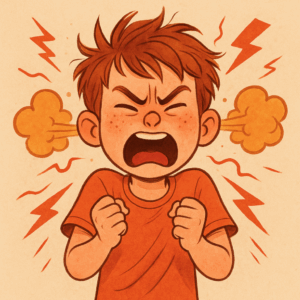ADHD and Emotional Outbursts: Why Small Things Feel So Big
You’ve seen it—or maybe lived it:
“Why are you overreacting?”
“It was just a small comment.”
“You’re either too angry or completely shut down.”
For many people with ADHD, emotional regulation is just as difficult as attention or focus—but it gets far less attention.
Let’s dive into why emotional outbursts happen in ADHD—and how to manage them better.

🧠 The Science: ADHD Is Not Just About Attention
ADHD affects the brain’s executive functioning systems, including:
-
Impulse control
-
Emotional regulation
-
Response inhibition
That means people with ADHD feel emotions quickly, intensely, and for longer—whether it’s frustration, excitement, shame, or anger.
💥 Common Emotional Struggles in ADHD
1. Rejection Sensitivity
Small criticisms can feel like major betrayals. The emotional pain is real—not imagined.
2. Frustration Intolerance
When something doesn’t go as expected (traffic jam, app crash), it feels unbearable.
3. Mood Swings
Rapid shifts from motivation to despair, especially when plans fail or delays happen.
4. Emotional Flooding
When overwhelmed, the person may shut down completely or lash out—then regret it later.
🚫 Why This Gets Misunderstood
-
They’re called “dramatic” or “immature”
-
Teachers label it as “behavioural issues”
-
Adults internalize it as “I’m too sensitive” or “something’s wrong with me”
The reality? It’s part of how their brain is wired.
✅ How to Help (Or Help Yourself)
-
Name the feeling – “I’m feeling rejected. I need a moment.”
-
Delay your response – Even a 5-second pause can prevent overreaction
-
Use grounding tools – Cold water, deep breathing, walking away
-
Work on cognitive reframing – With the help of CBT or a therapist
-
Consider medication – Some ADHD medications also reduce emotional reactivity
-
Don’t shame the emotion – Validate first, then address behavior
💡 Therapy Tip
Ask your therapist about Rejection Sensitivity Dysphoria (RSD)—a term often used to describe the deep, sudden pain experienced in response to perceived rejection. It’s not in diagnostic manuals, but it’s very real to those who feel it.
Final Thoughts
If you or your child with ADHD often feel “too much”, know this:
You’re not broken.
You’re not overreacting.
Your emotional brain just needs different tools and support.
Support for Emotional Dysregulation in ADHD
At Mind & Memory Lab, we provide:
-
Emotional skills training
-
ADHD-focused CBT & therapy
-
Medication review and management
-
QEEG-informed insight into your emotional brain
Dr. Srinivas Rajkumar T
Consultant Psychiatrist
Apollo Clinics Velachery & Tambaram
Website: www.srinivasaiims.com
📞 Call: 85951 55808